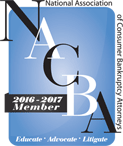Features Articles:
Disclaimer:
(1) I am a licensed IL attorney & debt relief agent. I help people get out of debt through bankruptcy, lawsuit defense, and negotiated settlements.
(2) This website is an advertisement for legal services to IL residents only.
(3) The information on this website is for general educational purposes only. It is not specific legal advice to you. Do not rely on it. See a licensed attorney before taking any action.
(4) An attorney-client relationship can only be formed by signing a written contract for representation.Member:

National Association of Consumer Bankruptcy Attorneys
A.B.I
American Bankruptcy Institute
 Better Business
Bureau
Better Business
Bureau
If you are unable to pay back debt, you may be considering filing a bankruptcy to eliminate that debt. If so, you’ve probably wondered what’s the difference between a chapter 7 and a chapter 13 bankruptcy.
Well, there are many differences. But, the most basic difference is that a chapter 7 is for individuals who cannot afford to pay back any of their debt from their wages, while a chapter 13 is for those who can afford to pay back some of their debt from their wages.
To be qualified for a chapter 7 you must generally earn at or less than the median income. That’s because the law assumes that the middle class generally lives paycheck to paycheck and can barely afford to pay for all of life’s necessities. And so it’s logical, if you can’t pay for necessities, you certainly can’t afford to pay back debt from your wages, so you don’t have to.
All we do is look at your property to see in you have anything that is worth more than the protected limits. Now it’s rare that something is worth more than those limits, because the law generally protects everything the average middle class person owns. That’s why in 99% of my chapter 7 cases, clients get out of debt while keeping everything they own including homes, cars, retirement account, cash and more.
But, if you had something very valuable, like a Van Gogh, those would be sold and paid to your creditors. Whatever debt is paid from that sale is paid back, and whatever dischargeable debt remained is then wiped out when you get your discharge.
Because in a chapter 7 we’re just asking 2 questions: (1) are you qualified and (2) is there something to taken, a chapter 7 is a quick process which lasts from beginning to end usually 4 month.
Now, if you make over the median income, you are generally required to go into a chapter 13. But, and I can’t emphasize this enough, there are many many many exceptions to this rule. In fact, I have filed chapter 7s for numerous individuals who earned more and sometime much more that the median income because of the exceptions. That’s why you need an experienced attorney, such as myself, to represent you.
In a chapter 13 we start by developing a budget to determine how much of your debt you can afford to pay back after taking care of your necessities. These necessities are probably broader than you think. They include things not only like food and clothing, but also mortgage payments, car payments, utilities, cable bills, cell phone bills, internet bills, insurance, etc. Whatever is left over after payment of these necessities, what we call your disposable income, we propose a plan to pay that amount from your wages every month over a period of no more than 5 years.
The amount paid back differs from person to person because we all have different needs, earning, and expenses. Sometimes its 5%, sometime its 50%, it differs. The point is you pay back what you can afford.
Once you have completed your chapter 13 payments, whatever discharable debt you did not pay back is wiped out. So if you proposed to pay back 15% of your debt and you have done so, the remaining 85% of your dischargeable debt is wiped out.
Obviously, that’s a very simple explanation of the main difference between a chapter 7 & 13. There are many other differences & reasons why people file one chapter even when they qualify for another. That is why it’s important to hire an experienced attorney like myself to guide you in the correct direction.
So if you have debt that you cannot afford to pay, call me, attorney Robert J. Skowronski, at 773-283-1600 to set up your free consultation. You can also email me. I guarantee you that you’ll leave our appointment feeling better, with less stress and anxiety, because together we’ll create a plan to get you out of debt and which accomplishes you goals. I look forward to assisting you.


